- Hardcover: 276 pages
- Publisher: Palgrave Macmillan (4 Sep 2014)
- Language: English
- ISBN-10: 1137368659
- ISBN-13: 978-1137368652
- Product Dimensions: 23.6 x 15.2 x 2 cm
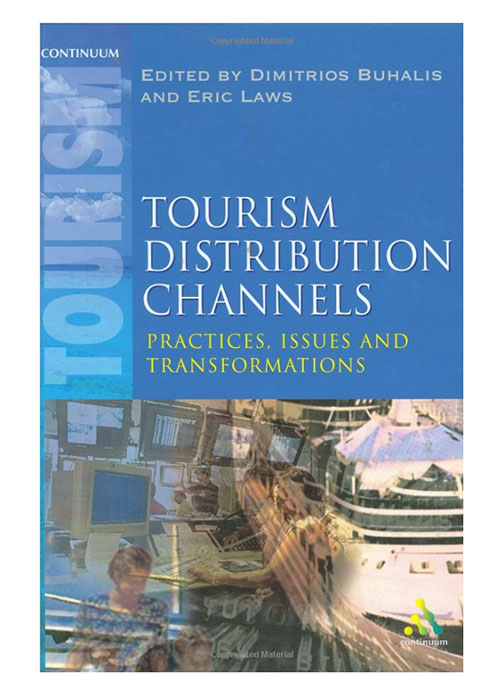
Tourism Distribution Channels
Buhalis, D., Laws E., 2001,Tourism Distribution Channels: Patterns, Practices and Challenges,co-editor, Thomson, London, ISBN 0826454704.
While the hospitality industry and air carriers are rather well addressed by academic literature (lately, the same case is with tour guides who act as small players offering `ancillary services’), other important service providers in tourism, such as tour operators and travel agents, are rarely a subject of scientific interest and research. In this regard `Tourism Distribution Channels’ represents a particularly valuable book consisting of 23 chapters authored by various authors. In their focus are intermediaries in contemporary tourism, primarily the tour operating and travel agency sector, but also some other factors of the tourism distribution mechanism such as the national tourism or destination marketing organizations. In sum, the topic of distribution is comprehensively covered (theory, practices, ethics, sustainability, prospects etc.) and illustrated with examples, case studies, tables and figures. Keeping in mind that the book was published in 2001, and that in the meantime transformations and changes in this field have been so rapid and profound, the reader should expect some already outdated facts (mainly those regarding the marketplace situation with tour operators). Nevertheless, the role of information technology, the Internet and GDSs in the tourism distribution has not been missed. The book is highly recommended for students of tourism management, but it would be very useful to all those interested in this constantly changing, rather fluid and, at least by academics, neglected aspect of tourism.
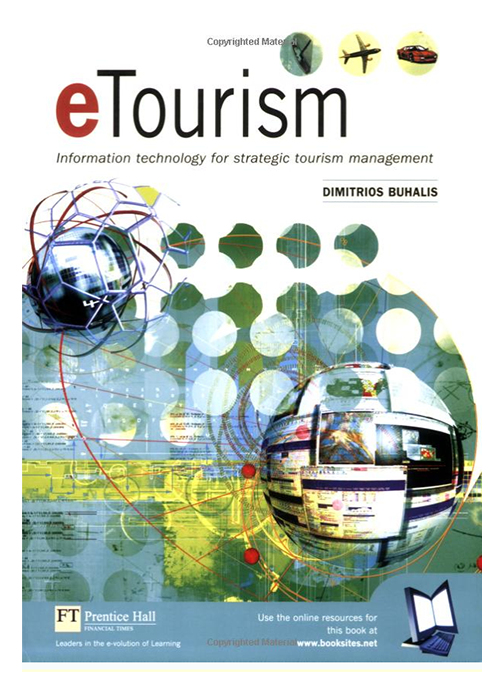
eTourism
Buhalis, D., 2003,eTourism: information technology for strategic tourism management,Pearson (Financial Times/Prentice Hall), London ISBN 0582357403.
The book is aimed at advanced undergraduate and postgraduate students in business, tourism and hospitality programmes that need to explore how they can use ICTs in a strategic context. It is also anticipated that researchers and practitioners will find it useful and stimulating. This book addresses the digitization of all processes and value chains in the tourism, travel, hospitality and catering industries. By analysing the new technological trends it provides a solid basis for analysing the impacts of the Information Communication Technology (ICT) revolution on the tourism industry. The book adopts a strategic management and marketing perspective for tourism enterprises and destinations. It suggests that eTourism revolutionizes all business processes, the entire value chain as well as the strategic relationships of tourism organizations with all their stakeholders. It additionally focuses on how ICTs are employed in airlines, hotels, travel agencies, tour operators and destinations management organizations. The book demonstrates that eTourism increasingly determines the competitiveness of the organization, and therefore, it is critical for the competitiveness of the industry in the longer term.
Features
Strategic perspective demonstrates the contribution of ICTs to tourism organizations’ competitiveness
A wealth of international examples ensure global application and relevance
Extensive use of case studies and illustrative examples demonstrate the link between theory and real world tourism situations
Further discussion topics encourage students to analyse further the information covered
Extensive bibliography and further reading encourage further study
Associated website featuring up-to-date FT articles and power point slides create a comprehensive teaching and learning package.
Table of Contents
List of figures, tables and case studies
Foreword
Acknowledgements
About the author
Preface
The information and communication technologies revolution and strategic management: issues – challenges – trends
1 Information and communication technologies: evolution and revolution
2 Implications of the ICT revolution for business and strategy
3 eTourism: the dynamic interaction of ICTs and tourism
4 Demand-driven eTourism
5 Supply-driven eTourism
6 Operational management and distribution in eTourism
7 eAirlines
8 eHospitality
9 eTour operators
10 eTravel agencies
11 eDestinations
12 eTourism: synthesis and a vision of the future
Back Cover
This book addresses the digitization of all processes and value chains in the tourism, travel, hospitality and catering industries. By exploring the new technological trends it provides a solid basis for analysing the impacts of the Information Communication Technology (ICT) revolution on the tourism industry. The book adopts a strategic management and marketing perspective for tourism enterprises and destinations. It suggests that ETourism revolutionizes all business processes, the entire value chain as well as the strategic relationships of tourism organizations with all their stakeholders. It additionally focuses on how ICTs are employed in airlines, hotels, travel agencies, tour operators and destinations management organizations. The book demonstrates that tourism ICTs increasingly determine the competitiveness of the organization, and therefore, they are critical for the competitiveness of the industry in the longer term.
The book is aimed at advanced undergraduate and postgraduate students in business, tourism and hospitality programmes that need to explore how they can use ICTs in a strategic context. It is also anticipated that researchers and practitioners will find it useful and stimulating.
Features and benefits:
- Strategic perspective demonstrates the contribution of ICTs to the competitiveness of tourism organizations and destinations
- A wealth of international examples ensure global application and relevance
- Extensive use of case studies and illustrative examples demonstrate the link between theory and real world tourism situations
- Discussion topics encourage students to analyse further the information covered
- Extensive bibliography and further reading encourage more advanced study
- Associated website featuring up-to-date FT articles and power point slides create a comprehensive teaching and learning package.
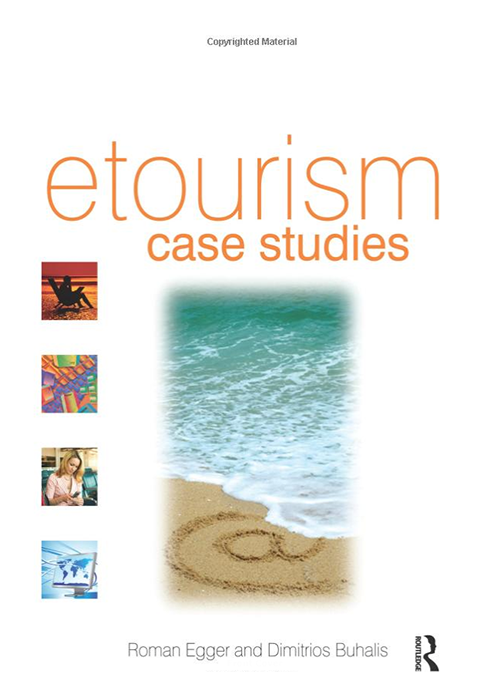
eTourism Case studies: Management & Marketing issues in eTourism
Roman Egger and Dimitrios Buhalis (editors), 2008, eTourism Case studies: Management & Marketing issues in eTourism, ISBN 0750686677, Butterworth Heinemann Oxford http://goo.gl/oavpD1
Edited By
Roman Egger, Program coordinator of the Centre of Future Research and lecturer in e-Tourism at the Salzberg University of Applied Sciences and at the University of Munich, Germany
Dimitrios Buhalis, Established Chair in Tourism, School of Services Management, Bournemouth University, UK
eTourism Case Studies bridges the gap in contemporary literature by carefully examining marketing and management issues of many international companies that have successfully implemented eTourism solutions. Divided into six sections this book explores the newest developments in this field, introducing and discussing emerging trends, approaches, models and paradigms, providing visions for the future of eTourism and supporting discussion and elaboration with the help of thorough pedagogic aids. With contributions from leading global experts both from the industry and academia, each case follows a rigid structure, with features such as bulleted summaries and review questions, as well as each section having its own thorough introduction and conclusion written by the editors, highlighting the key issues and theories. This is the first book of its kind to bring together cases highlighting best practice and methods for exploiting ICT in the tourism industry, from international market leaders.
Audience:
Primary: Final year undergraduate and post-graduate tourism and hospitality students on supplementary courses such as e-commerce for H&T industry, Internet stratetegies. Also student on generic business and management degrees at third year level. Secondary: Advanced professionals and research students undertaking research in the area.
CONTENT Introduction;Hospitality: InterContinental Hotel Group: Dealing with Online Intermediaries; InterContinental Hotel Group: Managing Inventory with HOLIDEX PLUS; Sino Group of Hotels: Handling multi property operations; Omena Hotels: Technology towards operational efficiency; Carnival City: Valuating Guests in the gaming Industry; Hotel Sallerhof: Innovations in Interaction; ?Emmantina? and ?Palmyra Beach? Hotels: Distribution for Independent Hotels; Intermediaries: Lastminute.com: From Reservation System to Lifestyle Portal; Expedia.de: Electronic Travel Supermarket; Wotif.com: Last minute selling of distressed accommodation inventory; A2Z Professional Travel Ltd.: Online Travel Agency in Thailand; ITWG: Increasing intermediated flows; Incoming Partners: Integrating operations; Orbis On Line: Internet distribution strategies for a regional hotel group; SideStep: Travel Meta Seach Engine; HolidayCheck: Rendering holiday impressions; TUI: Integrating Destination Information; Cultuzz: Managing eBay as a distribution channel; Amadeus: Evolution of GDS; Amadeus: Global Distribution System’s new paradigm; Pegasus Solutions: Providing Interconnectivity; Destination; VisitBritain: Satisfying the online Market dynamics; Spain.info: Towards Stakeholder Network; BonjourQuebec.com: A Vision, a Strategy, a Brand; The Province of Rimini: Communicating with the customer; Tanzania: Extending eTourism Tools utilisation; Tiscover: Destination Management System Pioneer; Feratel Media Technologies: Providing DMS Technology; Transportation; British Airways: Customer enabled interactivity; Kulula.com: Low Cost Carrier & ICTs; Finnair: Innovating Interactivity; Enterprise Rent A Car: Mainstreaming Distribution; ICT Systems; eCTRL Solutions: Trip@dvice Technology; The Green Card (Targeta Verda): A tourist card for the Balearic Islands; CheckEffect: Benchmarking eMarketing performance; Destimation.com: online solutions for Destination Management Companies; Lufthansa Systems: Dynamic Pricing; TAI (Day Trip Indicator): Measuring Value added in the tourism sector; Tourism Technology: Travel Wholesale Management System; Digital Tourism Assistant: Enquiry Management Solution for Destinations; Mobile systems: Rivertale: Mobile Services for Cruise Ships; LOVO: The Mobile Lifestyle Assistant; Aladdin: A Mobile Destination Management Solution for Incoming Agencies; Conclusion
http://goo.gl/oavpD1
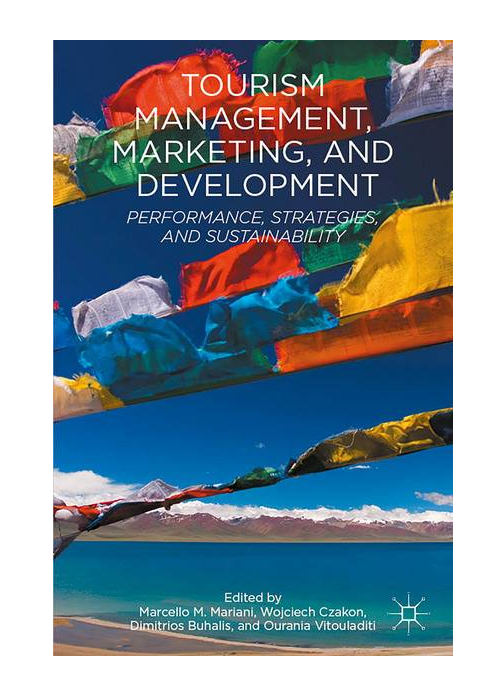
Tourism Management, Marketing, and Development : Performance, Strategies, and Sustainability
Companies and destinations in the tourism sector are confronted with increasing managerial challenges and have to deal with a competitive, turbulent, and fast-changing environment. The understanding that both tourism companies and destinations endowed with the best assets (natural and cultural) cannot survive the escalating international competition without good managerial practices, has provided significant momentum for the development of the disciplinary field of tourism management in the last three decades.
This volume recognizes the relevance of travel, tourism, and tourism activities as major economic drivers in the contemporary global economy, with a specific focus on performance, strategies, and sustainability. It is the collective intellectual effort of a number of international scholars, who cultivate original research on tourism management from a variety of theoretical perspectives. Together, they outline the importance for tourism companies and destinations to achieve and maintain a sustained competitive advantage by embracing sustainability and a Triple Bottom Line (TBL) approach to performance.
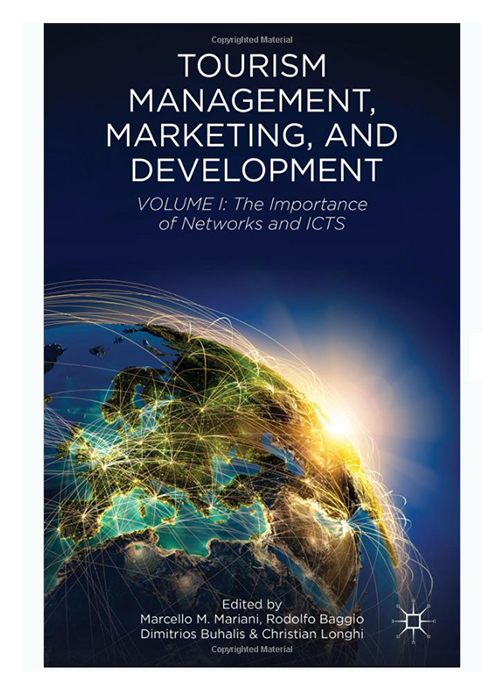
Tourism Management, Marketing, and Development : The Importance of Networks and ICTs
Product details |
Companies and destinations in the tourism sector are confronted with increasing managerial challenges and have to deal with a competitive, turbulent and fast changing environment. The understanding that both tourism companies and destinations endowed with the best assets (natural and cultural) cannot survive the escalating international competition without good managerial practices, has provided significant momentum for the development of the disciplinary field of tourism management in the last three decades.
This book provides an overview of the research field of tourism management, including twelve chapters from a diverse international group of academics. While drawing on multiple theoretical perspectives and adopting different epistemological paradigms and research methodologies,Tourism Management, Marketing, and Development recognizes the relevance of physical and digital networks for the development of one of the fastest growing sectors of the contemporary global economy: Travel & Tourism.
Marcello M. Mariani is Professor and Director of the Master in Business Tourism and Destination Management and the Master in Digital Marketing for Tourism at the University of Bologna, Italy.
Rodolfo Baggio is Professor and Coordinator of the Information and Communication Technologies area of the Master in Economics and Tourism at Bocconi University, Italy.
Dimitrios Buhalis is Professor and Director of the eTourism Lab at the School of Tourism at Bournemouth University, UK.
Christian Longhi is Senior Researcher in the French National Centre for Scientific Research (GREDEG-CNRS) and the University of Nice Sophia Antipolis, France.
“The international tourism industry has been experiencing unprecedented challenges in recent years. These challenges require new business concepts and knowledge to manage and operate to meet the global and local needs. The timely introduction of the first volume of Tourism Management, Marketing, and Development benefits readers from better understanding the latest research efforts, which are conducted by some of the world’s leading scholars in the field. I would highly recommend this book to practitioners, researchers, educators, and students who are interested in ICTs, networks, and tourism.” – Rob Law, Professor, School of Hotel & Tourism Management, The Hong Kong Polytechnic University, China “With global economic shocks and a rapidly changing external environment, tourism can no longer be left to the amateur. Successful tourism businesses and destinations must understand and utilise state-of the-art research and concepts in tourism management. This first volume of Tourism Management, Marketing, and Development draws together an international author team to provide an accessible and authoritative source book for these very approaches. It is therefore a must have volume for practitioners and academics alike.” – Chris Cooper, Professor and Dean of the Faculty of Business, Oxford Brookes University, UK “The book offers a compelling look into contemporary tourism management challenges that result from technological advances and a greater emphasis on networked approaches. Both conceptually stimulating and empirically rich, the chapters provide a unique perspective on issues and opportunities that emerge from the ever greater reliance on ICTs and increased recognition of the value of coopetition. A great collection of individual works that together illustrate the complexity of present-day tourism management.” – Ulrike Gretzel, Professor, UQ Business School, University of Queensland, Australia
Purchase the book from Amazon: http://goo.gl/p1pevj
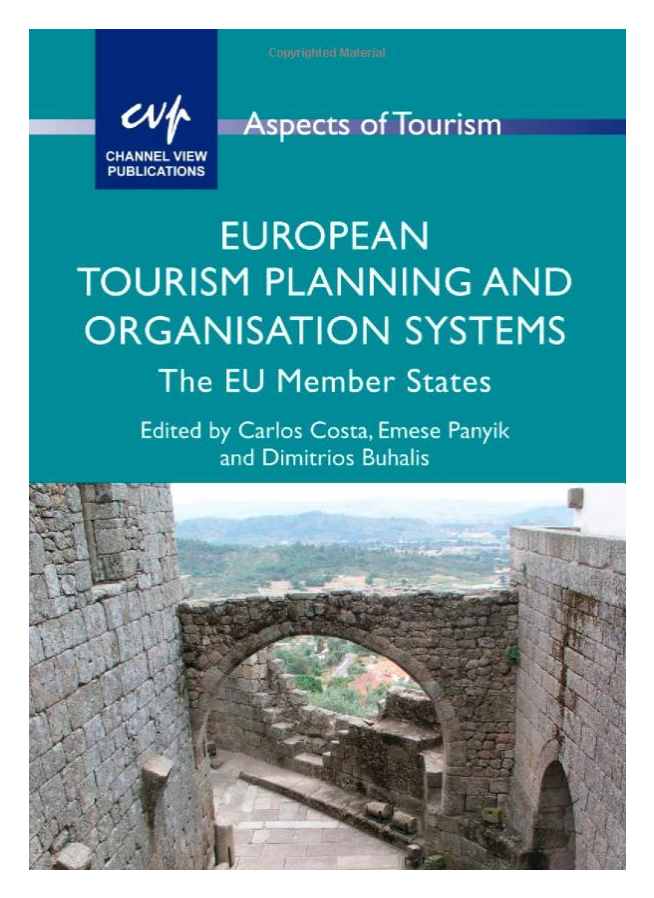
EUROPEAN TOURISM PLANNING AND ORGANISATION SYSTEMS: The EU Member States
Editor Information
Carlos Costa is Full Professor at the University of Aveiro and Editor of the Journal of Tourism & Development (Revista de Turismo e Desenvolvimento). His main research interests are tourism planning and management, organisations, networks, gender in tourism and tourism education.
Emese Panyik is Assistant Professor of Tourism at the Catholic University of Portugal (UCP), Braga Regional Centre. Her research interests include strategic tourism planning and management, rural governance, EU tourism policy, local policymaking and partnerships and host community impacts of tourism.
Dimitrios Buhalis is Professor of eTourism and Director of eTourism Lab at Bournemouth University. His research focuses on strategic management and marketing, tourism marketing, technology and eTourism.
Contents
1. Carlos Costa, Emese Panyik and Dimitrios Buhalis: A Comparative Approach to European Tourism Planning and Organisation Systems: An Introduction
SECTION 1. NORTHERN EUROPE
2. Janne J Liburd and Peter Saabye Simonsen: Tourism in Denmark – from Ugly Duckling to Our Journey;
3. Steven Richards and Keith Wilkes: Tourism in England: London 2012 Olympic Games and Beyond;
4. Seppo K. Aho: Finland Tourism Policies – From Helping to Build New State Identities to Branding a Modern Specific Destination;
5. Denis Harrington, Anthony Foley and Tony Lenehan: Tourism Research, Policy and Practice in Ireland – Current Developments and Future Research Trajectories;
6. Tommy D. Andersson: Tourism in Sweden – Between a Social Project and Business Development
SECTION 2. EASTERN EUROPE
7. Stanislav Ivanov and Miroslava Dimitrova: Managing Tourism in Bulgaria: Between ‘Mission Impossible’ and New Hope;
8. Heli Tooman and Heli Müristaja: Developing Estonia as a Positively Surprising Tourist Destination;
9. Iveta Druva-Druvaskalne and Agita Līviņa: Tourism in Latvia: From Fragmented Resorts of Russian Empire to a National Brand on International Level;
10. Ausrine Armaitiene and Renata Bertuzyte: Tourism Policy in Lithuania: Management of Permanent Transition;
11. Rodica Manuela Gogonea and Marian Zaharia: Tourism in Romania: From Centralized to Private Initiative, a Growth Path
SECTION 3. CENTRAL EUROPE
12. Roman Egger, Jutta Novak and Werner Taurer: Austria: Where Tourism has Tradition;
13. Jarmila Indrová and Zdenka Petrů: The Czech Republic – Destination in the Heart of Europe;
14. Judith Jochmann and Harald Pechlaner: Germany Tourism: Evolution, Structures, Challenges and Perspectives;
15. Emese Panyik and Tamara Rátz: Tourism Policy in Hungary: From Central Planning to Multi-level Destination Management;
16. Grzegorz Gołembski and Agnieszka Niezgoda: Organization of Tourism in Poland after Twenty Years of Systematic Changes; 17. Jana Kučerová and Tomáš Makovník: Tourism in Slovakia: “The Best Kept Secret in Europe”
SECTION 4. SOUTHERN EUROPE
18. Alexis Saveriades: Strategic Planning in National Tourism Organisations: The Case of Cyprus;
19. Paris Tsartas, Andreas Papatheodorou and Magdalini Vasileiou: Tourism Development and Policy in Greece;
20. Mara Manente and Valeria Minghetti: Tourism in Italy: “Work in Progress”;
21. Heidi Pantzar and Emese Panyik: Tourism in Malta: From the Knights of St. John’s to an Independent State;
22. Carlos Costa and Armando Luís Vieira: Tourism Planning and Organisation in Portugal;
23. Sonja Sibila Lebe: From Cheap Destination Image to Sophisticated Offer;
24. Josep A. Ivars Baidal: Spain: From the Mass Model to a New Tourism Economy
SECTION 5. WESTERN EUROPE
25. Anya Diekmann, Jeroen Bryon and Isabelle Cloquet: Explaining Tourism Governance in Belgium: Quite a Balancing Act;
26. Vincent Vlès, Emmanuelle Marcelpoil and Isabelle Frochot: Strengths and Paradoxes of French Tourism Planning;
27. Alan Clarke: Luxembourg: Quality is Key;
28. Jaap Lengkeek: Behind Windmills and Flower Bulbs: Tourism Policies in the Netherlands;
29. Carlos Costa, Emese Panyik and Dimitrios Buhalis: Towards an Emerging Planning and Organisational
Framework: Conclusions
Description
This book provides a systematic, country-by-country analysis of tourism policy, planning and organisation in the EU. It applies a conceptual framework to offer a new critical approach to comparative policy analysis in tourism in the EU.
Series: Aspects of Tourism
Format: 234 x 156 (R8vo) Pages: c. 512pp Pub Date: c. 15/05/2014
Hbk ISBN 9781845414337
Pbk ISBN 9781845414320
£109.95 / US$179.95 / CAN$179.95 / €129.95
£34.95 / US$59.95 / CAN$59.95 / €44.95
Level: Postgraduate, Research / Professional, Undergraduate
Territory: World
Subject (BIC): KNSG Tourism Industry, 1D Europe, RP Regional and area planning

Trends in European Tourism Planning and Organisation, Carlos Costa, Emese Panyik, Dimitrios Buhalis, Channel View Publications, Bristol
Mollitia ut voluptas amet ex voluptates dignissimos eos voluptatibus et repudiandae perspiciatis ut qui blanditiis nulla sint vel enim qui
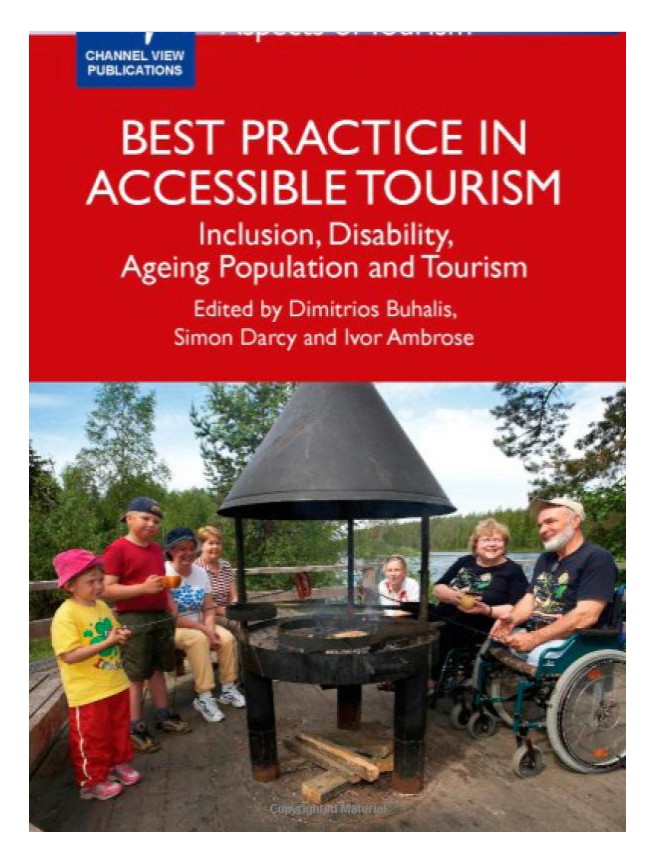
BEST PRACTICE IN ACCESSIBLE TOURISM : Inclusion, Disability, Ageing Population and Tourism
This volume focuses on policy and best practice in accessible tourism, reflecting the “state-of -the-art” as expressed in a selection of international chapters.
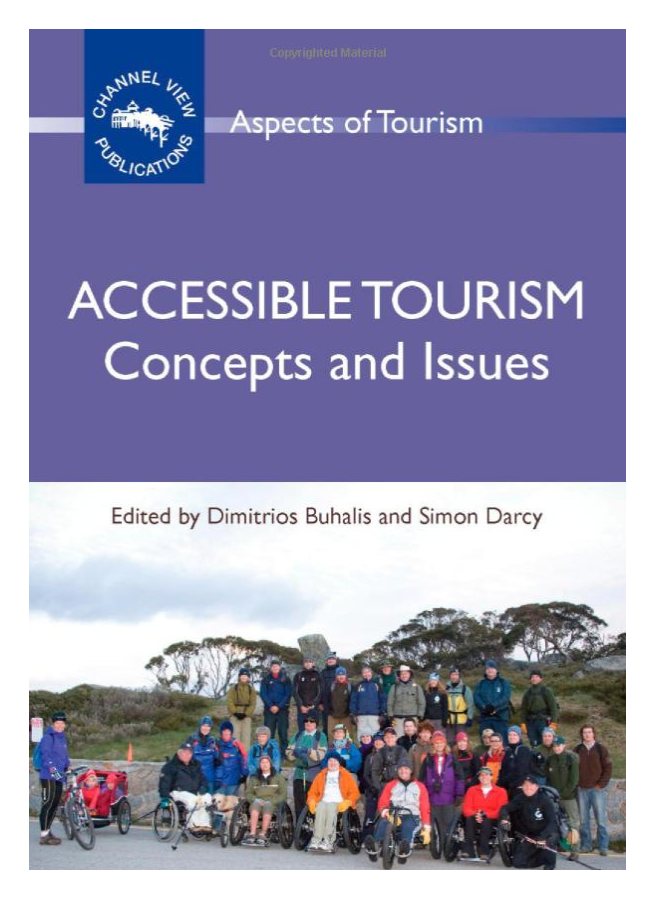
ACCESSIBLE TOURISM Concepts and Issues
Summary:
Inclusion disability, an ageing population and tourism are increasingly important areas of study due to their implications for both tourism demand and supply.